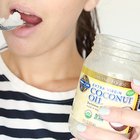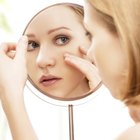Acne is an inflammatory skin condition which, according to the American Academy of Dermatology, afflicts 40 to 50 million Americans. It is the most common skin condition in the United States. Acne can be difficult to get rid of, but there are a wide variety of treatments available--both medical, cosmetic and organic--that can reduce or even eliminate the appearance of acne.
Signs of acne inflammation are redness and puffiness. Inflamed skin may also be tender or sensitive to the touch. It's important to be aware of the ways to treat inflamed acne properly, as inflamed acne can eventually scar.
Wash your face twice a day with a gentle, oil-free, unscented cleanser. Do not scrub your skin, as that can cause acne inflammation to worsen. Avoid alcohol-based cleansers, toners and aftershaves.
Eat a diet rich in omega-3 fatty acids eicosapentaenoic acid (EPA) and docosahexaenoic acid (DHA). Fish, such as salmon, tuna, sardines and anchovies all contain EPA and DHA. According to a 2004 study performed by H. Shahbakhti, et.al, at the Department of Dermatology, Royal Liverpool University Hospital and University of Liverpool, in Liverpool, United Kingdom, EPA and DHA are effective in reducing inflammation, similar to nonsteroidal anti-inflammatory drugs (NSAIDS) but without the harmful side effects.
Consume the daily required amount of vitamins A and E. In a study conducted by Z. El-akawi, et.al, at the Jordan University of Science and Technology School of Medicine, researchers found, compared to the control group, acne patients were deficient in plasma concentrations of vitamins A and E. Furthermore, the worse the acne, the lower the concentrations of vitamins A and E. A 2002 study published in the the Journal of Nutrition also showed that deficiencies in vitamin A caused inflammation or worsened existing conditions. (see Resources 2)
Talk to your doctor about increasing your zinc intake to 30 mg or greater. A study published in a 2001 issue of Dermatology, Vol. 203, No. 2, showed that taking 30 mg of zinc gluconate a day helped reduce inflammation in acne sufferers. High levels of zinc can cause a number of deleterious side effects, such as anemia or impaired immune function. Therefore, you should not take more than the daily recommended amount without a doctor's supervision.
Apply niacinamide (a form of niacin)--also known as nicotinamide--topically to the affected areas two times a day. Not only does niacinamide help to reduce inflammation, it also can reduce the amount of sebum secreted onto your skin by the sebaceous glands. A doctor's prescription is required to obtain topical niacinamide.
Ask your doctor or dermatologist about getting a prescription for antibiotics. Antibiotics can eliminate bacteria and reduce acne inflammation.
Related Articles

The Best Vitamins for Sinuses

Vitamins for Mental Alertness

Can Age Spots Be Reversed?

Collagen & Rosacea

Skin Benefits of Eating Coconut Oil

List of Retinoids

Zinc Treatment for Rosacea

Vitamins for Fair Skin

How to Repair Open Pores

Cleansers for Rosacea That Unclog Pores

Can Tri-Luma Be Used to Fade Acne Scars?

Seborrheic Dermatitis & Nutritional ...

Nutrition Information on Blueberries

Skin Care Products That Contain ...

L-Lysine for Hair Growth

What Vitamins Help the Liver?

How to Get a Pimple to Go Away Fast

Nutrition Information For a 16-Ounce ...

How to Get Clear Skin in 5 Days

What Are the Benefits of Ashwagandha in ...
References
Writer Bio
Ruri Ranbe has been working as a writer since 2008. She received an A.A. in English literature from Valencia College and is completing a B.S. in computer science at the University of Central Florida. Ranbe also has more than six years of professional information-technology experience, specializing in computer architecture, operating systems, networking, server administration, virtualization and Web design.